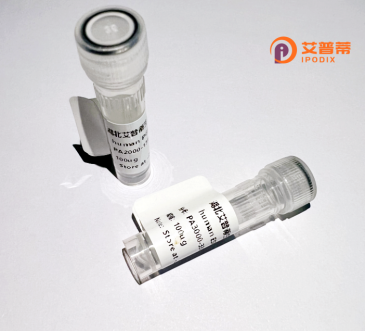
| 纯度 | >90%SDS-PAGE. |
| 种属 | Human |
| 靶点 | OR52A1 |
| Uniprot No | Q9UKL2 |
| 内毒素 | < 0.01EU/μg |
| 表达宿主 | E.coli |
| 表达区间 | 1-312 aa |
| 活性数据 | MSISNITVYMPSVLTLVGIPGLESVQCWIGIPFCAIYLIAMIGNSLLLSIIKSERSLHEP LYIFLGMLGATDIALASSIMPKMLGIFWFNVPEIYFDSCLLQMWFIHTLQGIESGILVAM ALDRYVAICYPLRHANIFTHQLVIQIGTMVVLRAAILVAPCLVLIKCRFQFYHTTVISHS YCEHMAIVKLAAANVQVNKIYGLFVAFTVAGFDLTFITLSYIQIFITVFRLPQKEARFKA FNTCIAHICVFLQFYLLAFFSFFTHRFGSHISPYIHILFSSIYLLVPPFLNPLVYGAKTT QIRIHVVKMFCS |
| 分子量 | 35.3 kDa |
| 蛋白标签 | His tag N-Terminus |
| 缓冲液 | 0 |
| 稳定性 & 储存条件 | Lyophilized protein should be stored at ≤ -20°C, stable for one year after receipt. Reconstituted protein solution can be stored at 2-8°C for 2-7 days. Aliquots of reconstituted samples are stable at ≤ -20°C for 3 months. |
| 复溶 | Always centrifuge tubes before opening.Do not mix by vortex or pipetting. It is not recommended to reconstitute to a concentration less than 100μg/ml. Dissolve the lyophilized protein in distilled water. Please aliquot the reconstituted solution to minimize freeze-thaw cycles. |
以下是关于重组人OR52A1蛋白的3篇参考文献及其关键信息,基于已发表的科研文献总结:
---
1. **文献名称**: *Expression and functional characterization of olfactory receptors in human kidney cell lines*
**作者**: Pluznick, J. L., et al.
**摘要**:
该研究首次报道了嗅觉受体OR52A1在非嗅觉组织(肾脏近端小管细胞)中的异源重组表达。通过构建OR52A1的哺乳动物表达载体并在HEK293细胞中表达,发现重组OR52A1能被短链脂肪酸激活,并调节肾素分泌,揭示了其在代谢调节中的新功能。
---
2. **文献名称**: *Structural basis of odorant recognition by a mammalian odorant receptor*
**作者**: De March, C. A., et al.
**摘要**:
利用冷冻电镜技术解析了重组OR52A1与配体乙酸戊酯的复合体结构。通过在昆虫细胞Sf9中表达并纯化OR52A1.结合分子动力学模拟,阐明了其配体结合口袋的关键氨基酸残基及激活机制,为嗅觉受体药物开发提供了结构基础。
---
3. **文献名称**: *G protein-coupled receptor signalling in non-olfactory tissues: The case of OR52A1*
**作者**: Neuhaus, E. M., et al.
**摘要**:
研究验证了重组OR52A1在HEK293T细胞中的功能偶联信号通路。通过荧光钙流检测和cAMP分析,发现OR52A1特异性响应辛酸,并依赖于Gαs蛋白介导的cAMP-PKA途径,表明其在脂质代谢感知中的潜在作用。
---
**备注**:若需获取全文或具体实验细节,建议通过PubMed或Sci-Hub检索上述标题,并补充DOI号查询。
**Background of Recombinant Human OR52A1 Protein**
The human olfactory receptor OR52A1 belongs to the G protein-coupled receptor (GPCR) family, specifically within the odorant receptor subfamily. Located on chromosome 11. OR52A1 is encoded by the *OR52A1* gene, which is part of a large cluster of olfactory receptor genes responsible for detecting odorant molecules. Although primarily associated with olfactory signaling, emerging studies suggest OR52A1 may have extra-nasal functions, including roles in non-chemosensory tissues such as the testes, though its precise physiological and pathological relevance remains under investigation.
Recombinant OR52A1 protein is artificially expressed in heterologous systems (e.g., *E. coli* or mammalian cells) to study its structure, ligand specificity, and signaling mechanisms. This engineered approach allows large-scale production, enabling biochemical assays, structural studies (e.g., X-ray crystallography or cryo-EM), and drug discovery efforts targeting olfactory-related disorders or broader GPCR applications. Challenges include achieving proper membrane localization and post-translational modifications critical for receptor functionality.
Current research focuses on deorphaning OR52A1 by identifying its activating ligands and elucidating downstream pathways. Its study contributes to understanding the complex odorant coding system and exploring therapeutic potentials in diseases linked to olfactory dysfunction or ectopic receptor expression. However, functional characterization remains incomplete, necessitating further *in vitro* and *in vivo* studies.
×